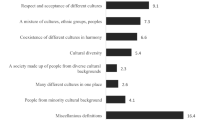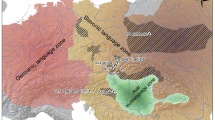Abstract
The notion of ‘superdiversity’ has engaged scholars beyond the field of sociolinguistics. In this paper we propose to shift the gaze to the linguistic, focusing on the ways in which the new diversity becomes the site of negotiations over linguistic resources, and to widen the scope of debate. The ways in which people negotiate access to resources in increasingly diverse societies are changing. Looking at these phenomena through a sociolinguistic lens is key to a developed understanding of superdiverse societies. García proposes the term ‘translanguaging’ to refer to the multiple discursive practices in which multilingual speakers engage in order to make sense of their worlds. Translanguaging goes beyond code-switching, but incorporates it. García points out that multilinguals translanguage to include and facilitate communication with others, but also to construct deeper understandings. Translanguaging includes but extends what others have called language use and language contact among multilinguals. Rather than focusing on the language itself, translanguaging makes it apparent that there are no clear-cut boundaries between the languages of bilinguals. This paper draws on sociolinguistic ethnographic research projects which investigate the linguistic practices of children and young people in and around complementary (community-language) schools, to argue that multilingual young people in English cities access a wide range of semiotic resources in ways which are not bounded as ‘languages’. In developing a sociolinguistics of superdiversity we should look closely at practices of translanguaging, and consider the histories, geographies, and discourses which shape them.
Zusammenfassung
Der Begriff der Superdiversität beschäftigt auch Wissenschaftler außerhalb des Feldes der Soziolinguistik. In diesem Beitrag schlagen wir vor, den Blick auf die Frage der Sprache zu richten und sich auf die Wege zu konzentrieren, in denen die neue Diversität zum Raum für Verhandlungen über sprachliche Ressourcen wird. Die Art und Weise, mit der sich Menschen in zunehmend diversifizierten Gesellschaften Zugang zu Ressourcen verschaffen, ändert sich. Ein Zugang zum tieferen Verständnis von superdiversen Gesellschaften eröffnet sich, wenn man solche Phänomene aus soziolinguistischer Perspektive betrachtet. Garcia schlägt den Begriff „Translanguaging“ vor, der auf die multiplen diskursiven Praxen verweist, in denen mehrsprachige Sprecher den Sinn ihrer Welten erfassen. Translanguaging (für das es keinen deutschen Ausdruck gibt; gemeint ist: in Mehrsprachigkeit – sprachübergreifend – agieren) geht über Code Switching im Sinne des Wechselns zwischen Sprachen hinaus, schließt dies aber mit ein. Garcia weist darauf hin, dass Mehrsprachige in dieser Weise agieren, um Kommunikation mit anderen zu erleichtern – aber auch um tieferes Verständnis zu erreichen. Translanguaging schließt ein, und geht gleichzeitig über das hinaus, was als Sprachgebrauch und Sprachkontakt zwischen Mehrsprachigen bezeichnet wird. Statt auf Sprache selbst zu schauen, soll der Begriff verdeutlichen, dass es keine klaren Abgrenzungen zwischen den Sprachen von zwei- oder mehrsprachigen Menschen gibt. – Unser Beitrag berichtet aus soziolinguistisch-ethnographischen Forschungsprojekten, die die sprachlichen Praxen von Kindern und Jugendlichen innerhalb und im Umfeld von sog. community-language schools untersuchen – Schulen also, die neben dem regulären Schulsystem existieren, die oft von privaten Gemeinschaften getragen werden und in denen es um den Unterricht von Minderheitensprachen (community languages) geht. Wir legen dar, dass sich mehrsprachige Jugendliche in englischen Städten eine große Bandbreite von Ausdrucksmöglichkeiten aneignen, die nicht in ‚einer Sprache‘ im traditionellen linguistischen Verständnis aufgehen. Eine Soziolinguistik der Superdiversität sollte die Praxen des Translanguaging einbeziehen und die Geschichten, Geographien und Diskurse berücksichtigen, die sie gestalten.
Similar content being viewed by others
References
Anderson, B. (1998). The spectre of comparisons: Nationalisms, Southeast Asia, and the World. London: Verso.
Bakhtin, M. M. (1973). Problems of Dostoevsky’s poetics (Translated by R. W. Rotsel). Ann Arbor: Ardis.
Bakhtin, M. M. (1981). The dialogic imagination. Four essays (Edited by Michael Holquist; translated by C. Emerson and M. Holquist). Austin: University of Texas Press.
Bakhtin, M. M. (1984). Problems of Dostoevsky’s poetics (Edited and translated by C. Emerson). Manchester: Manchester University Press.
Bakhtin, M. M. (1986). Speech genres and other late essays (Edited by C. Emerson & M. Holquist). Austin: University of Austin Press.
Bakhtin, M. M. (1994). Problems of Dostoevsky’s poetics. In P. Morris (ed.), The Bakhtin reader. Selected writings of Bakhtin, Medvedev, Voloshinov (pp. 110–113), London: Arnold.
Blackledge, A. (2009a). ‘As a country we do expect’: The further extension of language testing regimes in the UK. Language Assessment Quarterly, 6, 6–16.
Blackledge, A. (2009b). ‘Inventing English as convenient fiction: Language testing regimes in the United Kingdom’. In G. Extra, M. Spotti, & P. VanAvermaet (eds.), Language testing, migration and citizenship: Cross-national perspectives (pp. 65–85). London: Continuum.
Blackledge, A. (2009c). Being English, speaking English: Extension to English language testing legislation and the future of multicultural Britain. In G. Hogan-Brun, C. Mar-Molinero, & P. Stevenson (eds.), Discourses on language and integration: Critical perspectives on language testing regimes in Europe (pp. 83–108). Amsterdam: John Benjamins.
Blackledge, A., & Creese, A. (2010). Multilingualism. A critical perspective. London: Continuum.
Blackledge, A., & Pavlenko, A. (2001). Negotiation of identities in multilingual contexts. International Journal of Bilingualism, 5(3), 243–259.
Blommaert, J. (2010). The sociolinguistics of globalization. Cambridge: Cambridge University Press.
Bolognani, M. (2007). The myth of return: Dismissal, survival or revival? A Bradford example of transnationalism as a political instrument. Journal of Ethnic andMigration Studies, 33(1), 59–76.
Borooah, V. K. (2005). ‘Caste, inequality, and poverty in India’. Review of Development Economics, 9(3), 399–414.
Borooah, V. K., Dubey, A., & Iyer, S. (2007). The effectiveness of jobs reservation: Caste, religion and economic status in India. Development and Change, 38(3), 423–445.
Bourdieu, P., & Darbel, A. (1991). The Love of Art. European museums and their public. London: Polity Press.
Cox, J., & Connell, J. (2003). Place, exile and identity. The contemporary experience of Palestinians in Sydney’. Australian Geographer, 34(3), 329–343.
Creese, A., & Blackledge, A. (2010). Translanguaging in the bilingual classroom: A pedagogy for learning and teaching. Modern Language Journal, 94(2), 103–115.
Creese, A., Bhatt, A., Bhojani, N., & Martin, P. (2006). Multicultural, heritage and learner identities in complementary schools. Language and Education, 20(1), 23–44.
Creese, A., Bhatt, A., & Martin, P. (2007a). Investigating multilingualism in Gujarati complementary schools in Leicester. Birmingham: University of Birmingham.
Creese, A., Blackledge, A., & Hamid, S. (2007b). Investigating multilingualism in Bengali complementary schools in Birmingham. Birmingham: University of Birmingham.
Creese, A., Lytra, V., Baraç, T., & Yağcıoğlu-Ali, D. (2007c). Investigating multilingualism in Turkish complementary schools in London. Birmingham: University of Birmingham.
Creese, A., Wu, C. J. & Wei, L. (2007d). Investigating multilingualism in Chinese complementary schools in Manchester. Birmingham: University of Birmingham.
Gal, S. (2006). Migration, minorities and multilingualism: Language ideologies in Europe. In C. Mar-Molinero & P. Stevenson (eds.), Language ideologies, policies and practices. Language and the future of Europe (pp. 13–27). Basingstoke: Palgrave Macmillan.
García, O. (2007). Foreword. In S. Makoni & A. Pennycook (eds.), Disinventing and reconstituting languages (pp. xi–xv). Clevedon: Multilingual Matters.
García O. (2009). Bilingual education in the 21st Century: A global perspective. Oxford: Wiley.
García, O. (2010). Languaging and ethnifying. In J. Fishman & O. García (eds.), Handbook of language and ethnicity: Disciplinary and regional perspectives (2nd ed., vol. 1, pp. 519–535). New York: Oxford University Press.
Gard’ner, J. M. (2004). Heritage protection and social inclusion: A case study from the Bangladeshi community of East London. International Journal of Heritage Studies, 10(1), 75–92.
Giddens, A. (1984). The constitution of society. Berkeley: University of California Press.
Glick Schiller, N., & Fouron, G. (2002). Georges woke up laughing: Long distance nationalism and the search for home. New York: Duke University Press.
Glick Schiller, N., Basch, L., & Blanc-Szanton, C. (1992). Towards a transnational perspective on migration: Race, class, ethnicity and nationalism reconsidered. Annals of New York Academy of Science, Vol. 645. New York: New York Academy of Science.
Gumperz, J. (1982). Discourse strategies. Cambridge: Cambridge University Press.
Harris, R. (2006). New ethnicities and language use. Basingstoke: Palgrave Macmillan.
Heller, M. (2007). Bilingualism as ideology and practice. In M. Heller (ed.), Bilingualism: A social approach (pp. 1–24). Basingstoke: Palgrave.
Heller, M., & Duchêne, A. (2007). Discourses of endangerment: Sociolinguistics, globalization, and social order. In A. Duchêne & M. Heller (eds.), Discourses of endangerment. Ideology and interests in the defence of languages (pp. 1–13). London: Continuum.
Hess-Lüttich, E. (1978). Bilingualismus als Stilmittel: Drogenkultur und Sprache. In G. Nickel (ed.), Rhetoric and Stylistics (pp. 69–82). Stuttgart: HochschulVerlag.
Irvine, J., & Gal, S. (2000). Language ideology and linguistic differentiation. In P. Kroskrity (ed.), Regimes of language. Ideologies, polities and identities (pp. 35–84). Santa Fe: School of American Research Press.
Jørgensen, J. N. (2010). The sociolinguistic study of youth language and youth identities. In J. N. Jørgensen (ed.), Love ya hate ya: The sociolinguistic study of youth language and youth identities (pp. 1–15). Cambridge: Cambridge University Press.
Kijima, Y. (2006). Caste and tribe inequality: Evidence from India, 1983–1999. Economic Development and Cultural Change, 54, 369–404.
Levitt, P., & Glick Schiller, N. (2004). Conceptualising simultaneity. A transnational social field perspective on society. International Migration Review, 38(3), 1002–1039.
Makoni, S., & Mashiri, P. (2007). Critical historiography: Does language planning in Africa need a construct of language as part of its theoretical apparatus? In S. Makoni & A. Pennycook (eds.), Disinventing and reconstituting languages (pp. 62–89). Clevedon: Multilingual Matters.
Makoni, S., & A. Pennycook (2007). Disinventing and reconstituting languages. In S. Makoni & A. Pennycook (eds.), Disinventing and reconstituting languages (pp. 1–41). Clevedon: Multilingual Matters.
Martin, P., Creese, A., Bhatt, A., & Bhojani, N. (2004). Final report on complementary schools and their communities in Leicester. Leicester: University of Leicester & University of Birmingham.
Maryns, K. (2006). The asylum speaker. Language in the Belgian asylum procedure. London: St Jerome.
May, S. (2001). Language and minority rights: Ethnicity, nationalism, and the politics of language. London: Longman.
May, S. (2005). Language rights: Moving the debate forward. Journal of Sociolinguistics, 9(3), 319–347.
Patrick, D. (2007). Language endangerment, language rights and indigeneity. In M. Heller (ed.), Bilingualism: A social approach (pp. 111–136). Basingstoke: Palgrave.
Pavlenko, A., & Blackledge, A. (2004). New theoretical approaches to the study of negotiation of identities in multilingual contexts. In A. Pavlenko & A. Blackledge (eds.), Negotiation of identities in multilingual contexts (pp. 1–33). Clevedon: Multilingual Matters.
Pennycook, A. (2010). Language as a local practice. London: Routledge.
Pujolar, J. (2007). Bilingualism and the nation-state in the post-national era. In M. Heller (ed.), Bilingualism: A social approach (pp. 71–95). Basingstoke: Palgrave.
Rampton, B. (1995). Crossing: Language and ethnicity among adolescents. London: Longman.
Rampton, B. (1998). Speech community. In J. Verschueren, J. Ostman, J. Blommaert, & C. Bulcan (eds.), Handbook of pragmatics (pp. 1–34). Amsterdam: John Benjamins.
Rampton, B. (1999). Styling the other: Introduction. Journal of Sociolinguistics, 3(4), 421–427.
Rampton, B. (2006). Language in late modernity. Cambridge: Cambridge University Press.
Silverstein, M. (2003). Indexical order and the dialectics of sociolinguistic life. Language and Communication, 23, 193–229.
Vertovec, S. (2006). The emergence of super-diversity in Britain (Centre on Migration, Policy and Society, Working Paper No. 25). Oxford: University of Oxford.
Vertovec, S. (2007a). Super-diversity and its implications. Ethnic and Racial Studies, 30(6), 1024–1054.
Vertovec, S. (2007b). Introduction: New directions in the anthropology of migration and multiculturalism. Ethnic and Racial Studies, 30(6), 961–978.
Vertovec, S. (2009). Transnationalism. London: Routledge.
Vološinov, V. N. (1973). Marxism and the philosophy of language (Translation. L. Matejka & I. R. Titunik, first published 1929). London: Seminar Press.
Author information
Authors and Affiliations
Corresponding authors
Rights and permissions
About this article
Cite this article
Creese, A., Blackledge, A. Towards a sociolinguistics of superdiversity. Z Erziehungswiss 13, 549–572 (2010). https://doi.org/10.1007/s11618-010-0159-y
Published:
Issue Date:
DOI: https://doi.org/10.1007/s11618-010-0159-y




